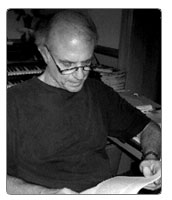

Mad
as hell
Hunger strikers protest drug industry’s stranglehold on psychiatry
By Michel Cicero
Last weekend, five people left their homes in various parts of the country to
starve themselves in Pasadena. As ex-psychiatric patients, they’re having
trouble swallowing the theory that all and sundry human emotional disturbances
are biologically rooted and best handled with medication.
Using the time-tested hunger strike as a mechanism for change, they intend to
rattle the main institutions of psychiatry — namely the National Alliance
for the Mentally Ill (NAMI), the American Psychiatry Association and the US Surgeon
General — into coughing up some real scientific evidence to support the
prevailing medical model in mental health treatment.
The hunger strike, or “fast,” is sponsored by Mind Freedom Support
Coalition International, a human rights umbrella organization that advocates
for individuals who have suffered under the care of the mental health system.
Prior to the fast, Mind Freedom called more than 9,000 supporters to action,
urging them to contact the target institutions for answers. A phone call to NAMI
confirmed that media relations personnel were unavailable to respond to the deluge
of calls they received. As of press time, no one from NAMI returned a call from
the Weekly.
Pasadena resident and Mind Freedom member Mickey Weinberg, one of the fast’s
organizers, along with solidarity strikers throughout the US and abroad, will
join the self-described “psychiatric survivors” in the fast.
Weinberg, a retired social worker who has no history of mental illness, pioneered
the use of grassroots organizing strategies within the psychiatry survivors movement
after witnessing numerous human rights abuses under the auspices of mental health
care. Institutionalized patients were “fair game for all sorts of medical
and psychological experimentation,” Weinberg explained.
Weinberg believes the hunger strike, while somewhat of a last resort, is a valuable
protest tool. “It was necessary to find something that was traditional
and dignified,” he said, “and couldn’t be tarred with charges
that these are just crazy people behaving in a crazy way.”
While historically hunger striking hasn’t always yielded optimal results,
it tends to draw awareness to the issue at hand, inevitably leading to progress.
In the mid-’80s, a homeless activist water fasted for 51 days. Though he
nearly died, his actions led to the construction of a $14 million shelter. Comedian-turned-activist
Dick Gregory once said that in the US, “where more people die from overeating
than under eating,” almost nothing will “get the attention of the
masses faster than fasting.”
The “Freedom Fasters” allege that the drug industry currently dominates
psychiatry and is able to do so because of the widely held belief that subtle
brain chemistry disturbances are responsible for an array of symptoms and behaviors
generally labeled “mental illness.” And these “illnesses” respond
best to medication. That model for health treatment is referred to as bio-psychiatry,
one of the most profitable of all industries and one that is rapidly globalizing.
“
We want the public to see that there’s another point of view, and that
that other point of view is legitimate,” said Weinberg. The Mind Freedom
fasters contend that while medication does help some people deal with psychological
problems, they are not curing any diseases. Additionally, there is no straightforward
evidence to prove that psychological ailments are biological diseases. Without
a real disease to cure, arguments in favor of medication hold no water. If schizophrenia,
depression and the myriad other “diseases” increasing numbers of
people are being medicated for were actually caused by abnormal brain function,
then they should be treated by neurologists.
Mind Freedom activists are not alone in this thinking. Weinberg says even the
Diagnostic and Statistical Manuel of Mental Disorders, psychiatry’s Bible,
hints that psychiatry is not a science and diagnoses are sometimes indiscriminate. “It’s
like saying, ‘You may have diabetes or you may have cancer, we’re
not sure, but we’re going to give you insulin,’” he said.
Mary Boyle Ph.D., head of the doctoral program in clinical psychology at the
University of East London, challenged the bio-psychiatry model as it pertains
to schizophrenia in a paper published by the British Psychological Society. She
revealed that little credence is given to psychological traumas that precede
the onset of schizophrenic behavior. Boyle wrote that, “substance abuse,
unemployment, social isolation, poverty, disrupted relationships, etc, are routinely
presented as consequences of having a serious mental disorder,’’ where
they should be acknowledged as potential causes of the patient’s psychological
discomfort and associated behaviors. This type of treatment yields a predictable
result: a diagnosis of schizophrenia, and at the very least, a prescription for
potentially dangerous, mind-altering medication.
Weinberg claims that if medication that dealt with real diseases had the problems
that the psychoactive drugs can have, they’d be pulled off the market quickly. “These
drugs aren’t meant to cure anything,” he said. “What they’re
meant to do is control people and make them more acceptable to other people.”
Although the Mind Freedom fasters don’t know what, if any, response they’ll
get from their nemeses in bio-psychiatry, they will consider eating again if
public interest and inquiry reaches a critical mass.
In a nutshell, “We want the public to begin to question the authority they’ve
given psychiatry,” said Weinberg.
For more information, visit www.mindfreedom.org.

